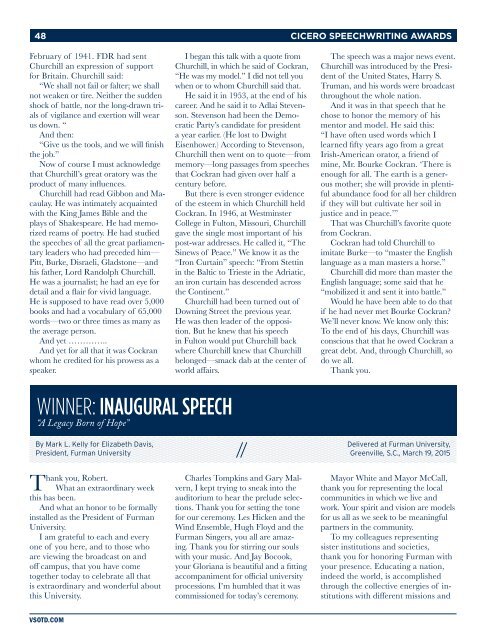THESE VITAL SPEECHES
4mSoSJ
4mSoSJ
Create successful ePaper yourself
Turn your PDF publications into a flip-book with our unique Google optimized e-Paper software.
48<br />
CICERO SPEECHWRITING AWARDS<br />
February of 1941. FDR had sent<br />
Churchill an expression of support<br />
for Britain. Churchill said:<br />
“We shall not fail or falter; we shall<br />
not weaken or tire. Neither the sudden<br />
shock of battle, nor the long-drawn trials<br />
of vigilance and exertion will wear<br />
us down. “<br />
And then:<br />
“Give us the tools, and we will finish<br />
the job.”<br />
Now of course I must acknowledge<br />
that Churchill’s great oratory was the<br />
product of many influences.<br />
Churchill had read Gibbon and Macaulay.<br />
He was intimately acquainted<br />
with the King James Bible and the<br />
plays of Shakespeare. He had memorized<br />
reams of poetry. He had studied<br />
the speeches of all the great parliamentary<br />
leaders who had preceded him—<br />
Pitt, Burke, Disraeli, Gladstone—and<br />
his father, Lord Randolph Churchill.<br />
He was a journalist; he had an eye for<br />
detail and a flair for vivid language.<br />
He is supposed to have read over 5,000<br />
books and had a vocabulary of 65,000<br />
words—two or three times as many as<br />
the average person.<br />
And yet …………..<br />
And yet for all that it was Cockran<br />
whom he credited for his prowess as a<br />
speaker.<br />
I began this talk with a quote from<br />
Churchill, in which he said of Cockran,<br />
“He was my model.” I did not tell you<br />
when or to whom Churchill said that.<br />
He said it in 1953, at the end of his<br />
career. And he said it to Adlai Stevenson.<br />
Stevenson had been the Democratic<br />
Party’s candidate for president<br />
a year earlier. (He lost to Dwight<br />
Eisenhower.) According to Stevenson,<br />
Churchill then went on to quote—from<br />
memory—long passages from speeches<br />
that Cockran had given over half a<br />
century before.<br />
But there is even stronger evidence<br />
of the esteem in which Churchill held<br />
Cockran. In 1946, at Westminster<br />
College in Fulton, Missouri, Churchill<br />
gave the single most important of his<br />
post-war addresses. He called it, “The<br />
Sinews of Peace.” We know it as the<br />
“Iron Curtain” speech: “From Stettin<br />
in the Baltic to Trieste in the Adriatic,<br />
an iron curtain has descended across<br />
the Continent.”<br />
Churchill had been turned out of<br />
Downing Street the previous year.<br />
He was then leader of the opposition.<br />
But he knew that his speech<br />
in Fulton would put Churchill back<br />
where Churchill knew that Churchill<br />
belonged—smack dab at the center of<br />
world affairs.<br />
The speech was a major news event.<br />
Churchill was introduced by the President<br />
of the United States, Harry S.<br />
Truman, and his words were broadcast<br />
throughout the whole nation.<br />
And it was in that speech that he<br />
chose to honor the memory of his<br />
mentor and model. He said this:<br />
“I have often used words which I<br />
learned fifty years ago from a great<br />
Irish-American orator, a friend of<br />
mine, Mr. Bourke Cockran. ‘There is<br />
enough for all. The earth is a generous<br />
mother; she will provide in plentiful<br />
abundance food for all her children<br />
if they will but cultivate her soil in<br />
justice and in peace.’”<br />
That was Churchill’s favorite quote<br />
from Cockran.<br />
Cockran had told Churchill to<br />
imitate Burke—to “master the English<br />
language as a man masters a horse.”<br />
Churchill did more than master the<br />
English language; some said that he<br />
“mobilized it and sent it into battle.”<br />
Would he have been able to do that<br />
if he had never met Bourke Cockran?<br />
We’ll never know. We know only this:<br />
To the end of his days, Churchill was<br />
conscious that that he owed Cockran a<br />
great debt. And, through Churchill, so<br />
do we all.<br />
Thank you.<br />
WINNER: INAUGURAL SPEECH<br />
“A Legacy Born of Hope”<br />
By Mark L. Kelly for Elizabeth Davis,<br />
President, Furman University<br />
Thank you, Robert.<br />
What an extraordinary week<br />
this has been.<br />
And what an honor to be formally<br />
installed as the President of Furman<br />
University.<br />
I am grateful to each and every<br />
one of you here, and to those who<br />
are viewing the broadcast on and<br />
off campus, that you have come<br />
together today to celebrate all that<br />
is extraordinary and wonderful about<br />
this University.<br />
Charles Tompkins and Gary Malvern,<br />
I kept trying to sneak into the<br />
auditorium to hear the prelude selections.<br />
Thank you for setting the tone<br />
for our ceremony. Les Hicken and the<br />
Wind Ensemble, Hugh Floyd and the<br />
Furman Singers, you all are amazing.<br />
Thank you for stirring our souls<br />
with your music. And Jay Bocook,<br />
your Gloriana is beautiful and a fitting<br />
accompaniment for official university<br />
processions. I’m humbled that it was<br />
commissioned for today’s ceremony.<br />
Delivered at Furman University,<br />
Greenville, S.C., March 19, 2015<br />
Mayor White and Mayor McCall,<br />
thank you for representing the local<br />
communities in which we live and<br />
work. Your spirit and vision are models<br />
for us all as we seek to be meaningful<br />
partners in the community.<br />
To my colleagues representing<br />
sister institutions and societies,<br />
thank you for honoring Furman with<br />
your presence. Educating a nation,<br />
indeed the world, is accomplished<br />
through the collective energies of institutions<br />
with different missions and<br />
VSOTD.COM


